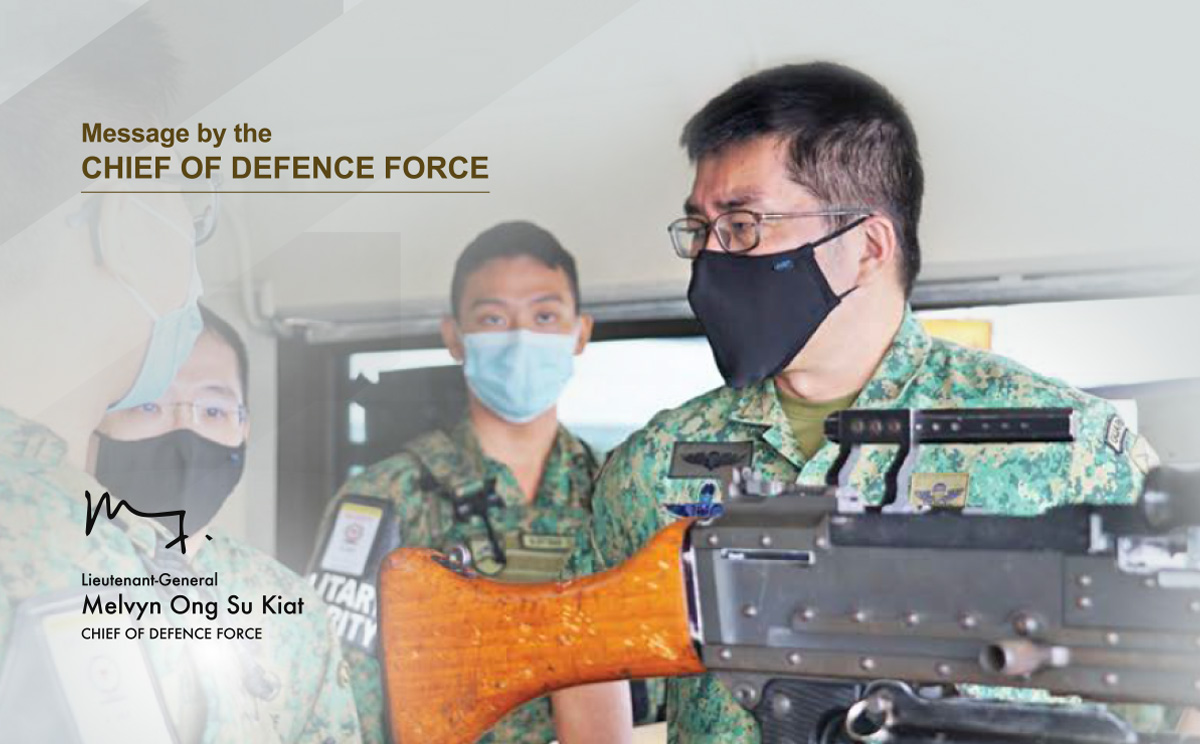
LG Ong engaging soldiers involved in security operations.
Men and women of the SAF,
The COVID-19 pandemic was a Black Swan that massively disrupted every aspect of our lives, at the personal, community and national levels. We all have our personal memories of the last two-and-a-half years of this difficult and unsettling time in all our lives. National safe management measures meant that we had to mostly work from home and our children had to do home-based learning. We could not see our relatives and friends for weeks on end, and we didn’t go anywhere unless we needed groceries. Exploring our parks and park connectors became a pastime as international travel ground to a halt.
It would not surprise anyone to know that my core memories of COVID-19 are of how it disrupted SAF training and operations, and the leadership actions it took to maintain a semblance of business-as-usual in the SAF while also supporting the Whole-of-Government (WoG) effort to deal with the pandemic. We had to minimise the risk of infection without compromising our ability to carry out our core mission of protecting our land, air, sea borders and cyber space. At the same time, the SAF also had to stand up a number of Task Forces to oversee multiple lines of operations. We could not fail on either front.
This monograph captures some leadership perspectives which explain how the SAF, the Task Forces, and commanders could adapt and respond to the challenges on both fronts in an operating environment that was volatile, uncertain, complex, ambiguous and disruptive (VUCA-D).
One of the things I remember best is how our commanders applied their skillsets to crisis management, whether in dealing with the dormitory crisis or the home recovery system as Singapore moved to living with endemic COVID-19. Commanders leveraged their DNA of systems thinking and discipline in executing operations, anchored on key leadership competencies. It affirmed our training in the SAF Battle Procedures, and showed how agile and effective they can be in complex situations when you integrate them with the SAF's action learning process to “learn on the go”. The combination of systems thinking, disciplined command and control (C2) and the humility to always adapt and learn on the go is a powerful one.
I also remember how our commanders recognised very early on that they did not “understand the enemy” fully and mission success also depended on how well they supported and worked with partners in the ministries, like Ministry of Manpower (MOM) and Ministry of Health (MOH). Humility and empathy are critical to success in a space where cause and effect are hard to ascertain. For many challenges that Singapore will face, we know the SAF is not the only tool in the toolbox, and we must continue to exercise this WoG muscle so that we can deal with the VUCA-D challenges that Singapore will invariably face in the future.
Another of my COVID-19 core memories is of how commanders and Task Forces worked in harmony with our Defence Technology Community colleagues to build technology solutions to the problems we faced. The mobile swab stations, the C2 systems to coordinate efforts in MOM and MOH, and the data applications in contact tracing operations are just some examples of the ops-tech thinking that has permeated the SAF over the last two decades. They demonstrated how data-driven decision making was critical to our operations. The SAF must continue to improve our data literacy and develop structures to make better use of data in our day-to-day operations. SAF leaders must continue to develop their ability to exploit this.
The memory that will always stay with me about the time of COVID is of the unity of purpose and the mission-focused orientation of the men and women of the SAF throughout the entire period. Our soldiers, sailors and airmen - across all operations and training establishments - had to observe stringent cohorting and safe management measures so that the SAF could carry on with our operations and training. They did this at some cost to their personal well-being but they did not flinch, and our commanders carried this intent well to the last person on the ground.
I am proud of the men and women of the SAF for showing their mettle throughout the COVID-19 crisis. I hope that our commanders will think deeply about the leadership perspectives captured in this monograph and further develop the lessons we can learn from our COVID-19 experience. These leadership perspectives and lessons will serve us well when we confront the next crisis, whenever that may strike us. The SAF must never be found wanting.